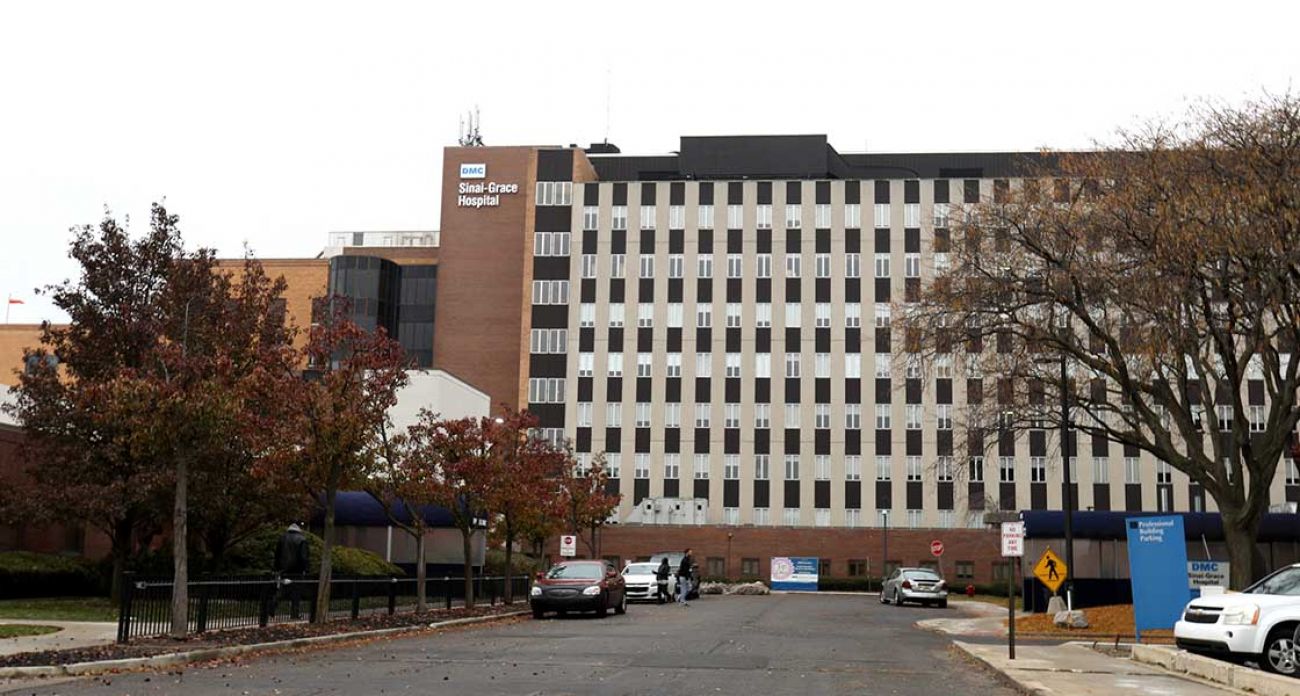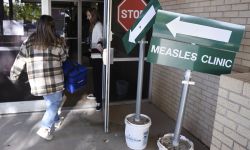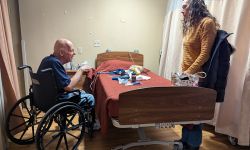Sinai-Grace nurses file lawsuit, allege patients died because hospital was short-staffed

He couldn't breathe, so he went to the busy emergency room at Detroit's Sinai-Grace Hospital in late March.
But instead of getting lifesaving treatment, the man became a victim of an overwhelmed hospital without the resources or staff to properly care for him, said Catherine Gaughan, a clinical coordinator who oversaw the emergency department the night of March 25.
"There's no way that man should have died," said Gaughan, describing him as young — in his late 30s or early 40s. "What had happened was the ventilator came disconnected, and because we didn't have the staff to properly monitor him, he died."
His death was one of dozens during the crush of the coronavirus pandemic in late March through mid-April that didn't have to happen in the Sinai-Grace emergency department, said Gaughan and three other nurses who are suing Tenet Healthcare, the for-profit parent company of the Detroit Medical Center, which runs Sinai-Grace.
They allege they were fired for speaking out about unsafe conditions at the hospital, according to the lawsuit filed Wednesday evening in Wayne County Circuit Court, which claims violations of the Michigan Whistleblowers’ Protection Act.
Stories from the front
Bridge Magazine, Detroit Free Press and Michigan Radio are teaming up to report on Michigan hospitals during the coronavirus pandemic. We will be sharing accounts of the challenges doctors, nurses and other hospital personnel face as they work to treat patients and save lives. If you work in a Michigan hospital, we would love to hear from you. You can contact reporters Robin Erb rerb@bridgemi.com at Bridge, Kristen Jordan Shamus kshamus@freepress.com at the Free Press and Kate Wells katwells@umich.edu at Michigan Radio.
Gaughan, 38, of Hazel Park, and nurses Sal Hadwan, 31, of Hamtramck; Jeffrey Eichenlaub, 41, of Troy, and Anthony Bonnett, 28, of Livonia each seek $25 million in damages.
Termination documents they provided to the Detroit Free Press show that an internal investigation at Sinai-Grace found they all violated Tenet's guidelines for conduct in use of social media and technology, protecting confidential information and other violations.
But their attorney, Royal Oak-based James Rasor, said their May 6 firings — ironically, on National Nurses Day — were connected to photos that were leaked to CNN in April showing body bags being stacked on the floor and shelving units of a refrigerated truck as well as on a bed and a chair in non-refrigerated empty rooms when Sinai-Grace ran out of space in the morgue.
THREAD: This is the true human cost of #COVID that you don't see on TV very often. CNN obtained photos from ER staff at a Detroit hospital, showing bodies pilled up in vacant spaces because the morgue was full. Nearly 1,500 people have died in Michigan, and 23,000 nationwide. pic.twitter.com/zqzkv1sZAB
— Marshall Cohen (@MarshallCohen) April 13, 2020
His clients, Rasor said, didn't send those photos to CNN. A co-worker who has since quit leaked the images, but they're being punished for it.
"Essentially, these individuals ... were terminated because they knew that a photograph had been taken which showed their employer's illegal conduct," Rasor said.

"Any photograph that was taken was taken strictly for the purpose of reporting to authorities and others as to the illegal and inhumane conditions and risky conditions. That's not a controlled space. Anybody can go in there. Those bodies were infected with a deadly virus. It's dangerous."
Brian Taylor, a spokesman for the DMC said the health system does not comment on pending litigation.
However, he shared a statement issued when the photos of people in body bags first surfaced:
“Our ethics hotline received complaints that employees had taken inappropriate photos of deceased patients at Sinai Grace Hospital and shared them with other employees. We conducted a comprehensive investigation and took appropriate action based on employee admissions of violations of our patients' right to privacy.
"We have an unwavering commitment and obligation to respect the privacy of our patients and to treat them with dignity and respect. We will not tolerate actions to the contrary."
We will continue to uphold our Standards of Conduct applicable to all employees and are grateful for the hundreds of team members at Sinai Grace Hospital whose courageous work and dedication to patients has been inspiring.”
'I think about that man all the time'
Gaughan said she didn't take the photos of patients in body bags or leak images to the cable news organization, but she called a supervisor to ask what to do on a night in early April when the morgue at Sinai-Grace filled up, two more people died in the emergency room, and there was nowhere to put the bodies.
She was told to bring them to an empty sleep lab room.
"We needed the stretchers because we did not have enough stretchers in our department for the people that were coming in," she said. "So we put them on the bed. The one person that I put on the bed, I will tell you, I held her hand when she died.
"After she died and passed away, do you think I felt good about putting her on that bed? No, I didn't. ... It bothered me. I thought that it was very inhumane what we were doing. I didn't feel right about it, but that was the direction I was given."
Placing a person who's died in an unrefrigerated environment leads to quicker decomposition, and bodily fluids loaded with virus and bacteria could contaminate any area where they are stored, Eichenlaub explained.
The patient whose body Gaughan moved to the sleep lab had a do-not-resuscitate order, she said.
"She had COVID symptoms," Gaughan said. "I had talked to her daughter previously, and was told to just, you know, make her comfortable. So literally, that's what we did was we made her comfortable, gave her medicine so she wasn't hurting. And I just held her hand and talked to her and said, 'Whenever you're ready to go, it's OK go.' ...
"But I will tell you there's other people that I know of that shouldn't have passed that did."
People like the young man who died when the ventilator was inadvertently detached, and no one noticed until he was dead.
The memory of that night haunts Gaughan.
She recalled hearing a doctor calling the man's family to deliver the news of his death over the phone.
"I was like, 'Hold on. ... You've got the wrong person.' ... I was in disbelief," Gaughan said. She couldn't understand how that man could have died, so she went to investigate.
"The ventilator that they put him on was an old ventilator that we've never used before," she said. "The respiratory therapist didn't know how to use it. Then he was taken over to TCU (transitional care unit), where there were 26 patients with two nurses to take care of all those patients."
Eichenlaub pointed out that the two nurses handling those 26 patients each had less than two years of nursing experience. And when a patient needed to be transported to the intensive care unit or elsewhere in the hospital, that left just one nurse to care for them all.
"Dozens of patients perished due to the inability of the overloaded medical staff to get to them, monitor them and provide treatment, including those that were only discovered to be deceased after they had died and rigor mortis had set in indicating that they had died some hours earlier and that their deaths had not been noticed," court documents read.
Gaughan said she has been diagnosed with post-traumatic stress disorder from the disturbing things she's witnessed and still struggles to process. it all.
"I think about that man all the time," she said. "I cried. That night, I cried twice."
Staffing shortages lead to mistakes, nurses say
In the heart of northwest Detroit, Sinai-Grace sits in the neighborhood that's been hardest hit by the coronvirus in a city that's seen 11,663 cases so far — more than any other city — or county — in Michigan.
As of Monday, the most recent day for which data was available, the city's Health Department reported that the 48235 ZIP code has tallied 1,032 confirmed COVID-19 cases, more than any other ZIP code in Detroit. It's also the ZIP code that's home to Sinai-Grace.
Sinai-Grace is the only hospital in that part of the city, DMC spokesman Taylor told the Detroit Free Press in an earlier interview. And it's surrounded by nursing homes filled with people who are especially vulnerable to COVID-19. It also gets more ambulance traffic than other hospitals.
All those factors made Sinai-Grace a hotspot at the height of metro Detroit's coronavirus surge.
For days in early April as the coronavirus caseload mounted at Sinai-Grace, nurses asked managers to bring in relief workers, Hadwan said. There were emergency department sit-in protests about nurse-to-patient ratios, which, he said, had become unsafe.
Many of the nurses who should have been working couldn't report to work because they were sick with COVID-19 themselves, he said. Others had quit because the conditions had gotten so bad.
Hadwan posted a Facebook Live video the night of April 5, explaining that managers had told the night-shift nurses who protested to go home, forcing the day shift to work 24-straight hours.

It was a staffing crisis the hospital didn't handle appropriately, said Eichenlaub, who was among the day-shift nurses who had to stay on duty for 24-straight hours.
"On April 5, we knew it was going to be severely short," he said. "We knew that and we were voicing concerns about it. What should have occurred that night is something that's called an internal disaster. ... That would cause all of leadership, every single leader in that establishment, to report to work to see what they could do to resolve the situation.
"So that night, when the night shift knew it was too unsafe for them to come out, and they were demanding more help, and ... they were told to leave because they were not going to get any help, that is when the internal disaster should have been declared."
"That is when they should have said, 'OK, this is an internal disaster."We should not be forcing our nurses to work 24 hours straight. Once you get to the point of a 12- to a 14-hour shift. ... you have a higher rate of errors that occur and there are going to be many more problems."
He said he talked to a manager and asked why an internal disaster had not been declared.
"She could not give me an answer," Eichenlaub said. "Nothing, nothing was done from an emergency standpoint."
His wife wrote letters to several state lawmakers, both U.S. senators from Michigan and the president about the conditions at the hospital, asking for an intervention.
But there was no relief until after the peak of the COVID-19 crisis, they said, when caseloads dropped off.
By the time contract nurses and others were brought in to fortify the nursing staff, Gaughan said patient loads in the emergency room had dropped to about one-quarter what they were at the the height of the pandemic's first wave.
"When we went down to like 30 patients in the ER, guess what? Then all the people came," Gaughan said of contract nurses. "They told us that they had asked to come when we were deep in all of it. They knew how bad it was here in Detroit, and they asked to come, and they were denied."
Audrey Gregory, the CEO of the DMC, told the Free Press in a late April interview that she "cannot account for the past or even what the perception is of the nurses at Sinai-Grace because what was recorded is not necessarily the reality that existed and I don't want to do a back and forth with those nurses.
"What I will tell you is that we have, and always have, provided safe patient care," Gregory said. "... We have had supplemental staff come in. We've had nurses from across the country who have come in. ... In the spirit of being transparent, where we are today in terms of the amount of nurses that we have ... compared to where we were a month ago in the initial surge, certainly it's different. ... I think, a month ago, two weeks ago, things were extremely overwhelming and daunting.
"It's a novel coronavirus. This is something new for us, how we feel as providers, watching the number of patients, how sick these patients are. So I will say that I will not argue with how the nurses feel. My role is to acknowledge how they feel and do everything I can to make sure it gets better for the nurses, and also making sure that we're providing great care for the patients."
Lack of staffing led to deaths, nurses say
It wasn't just a lack of staffing that was problematic.
Eichenlaub, Hadwan and Gaughan said at various points during the crisis, the emergency department at Sinai-Grace ran out of stretchers, hospital beds, ventilators, monitors to track patients' vital signs, body bags and oxygen tanks, too.
"When we realized we were running out of body bags — we had one left — we just hoped that no one else was going to die," Eichenlaub said.
Hadwan said some patients came to the emergency room and had to wait in chairs because there weren't enough stretchers or beds. Many patients who had beds were lined up in hallways because there weren't enough monitors to track their vital signs. By placing them in hallways, the nurses could more easily see if they were in distress.
Many patients needed ventilators.
"Some of these patients were in the ED (emergency department) for five to seven days on a ventilator," said Hadwan, who also serves on the Hamtramck Public Schools Board of Education. "Those people shouldn't have been in the emergency department that long because they needed to be in the ICU."
Lack of appropriate care led to what became an all-too-familiar progression of disease, Eichenlaub explained.
"They were down there for such a long time, and with such short staff and such poor working conditions, you're not going to be able to give them everything they possibly need. So of course they're going to deteriorate," he said.
"They would come in short of breath. They required oxygen. We'd give them oxygen for six hours. Between hour six and hour eight, they would go into distress. By hour 10, we would intubate. By hour 13, they were coding and we were doing CPR.
"It was this progression for every single patient who was coming in. ... We saw them as they were deteriorating right in front of us and there was nothing we could do about it because we had no resources, no extra staff. We had no ability to give them what they need."
Worse, said Hadwan, was when a directive came down from hospital management that CPR would no longer be allowed for any patient suspected of having COVID-19 because of the risk of infecting staff.
"That bothered me the most," Hadwan said. "Because you're not even telling family that you're not doing CPR on these people. The families, in their minds, they're thinking that we did the most that we could ... for their loved one, when we really didn't."
In a span of four days — a Monday night to a Thursday morning — Gaughan said she remembers counting 104 people who died in the Sinai-Grace emergency department.
"We went into emergency medicine to save people," she said. "That's why we work in the emergency department. We are nurses, and we are going to do everything that we can to save a person because we think of them like that could be my grandma, that's my grandpa, that's my kid. Just sitting there watching these people die is probably one of the hardest things that all of us have been through."
Then, they started to run out of oxygen tanks.
One night, Gaughan recalled that several patients were hooked up to empty tanks. The main supply room had none.
She said she frantically called every manager she could think to call, trying to secure more oxygen tanks for patients who were starved of it.
Finally, she said one respiratory manager told her: " 'I'm sorry. There's nothing I can do. ... That's a special order that has to be placed in the morning.' So, I'm freaking out because I had the weight of 130 patients on my shoulders by myself."
When it became clear no help was coming, she and the staff used splitters so the remaining tanks could be shared among two patients.
"We had to put tubing from other patients' rooms, tape it down on the floor all the way to the hallway," Hadwan explained. "The hallway was full of taped tubes that were trying to keep people on oxygen, to keep them alive."
But sharing tanks created a whole new problem. Any patient who didn't have COVID-19 who was paired with a patient who had the virus was likely to get infected.
And at that point, Gaughan said, it was taking days, sometimes weeks, to get coronavirus test results. So they didn't know which patients were COVID-positive and which were negative.
Eichenlaub said running the tubing from room-to-room on the floor and in the halls also meant that many patients were unknowingly disconnected when carts and stretchers were pushed over the top of the tubes.
"You'd look over and there's grandma ... completely ... disconnected," he said.
In many cases, Gaughan said, they didn't know if patients had adequate oxygen supply at all.
"We don't know if they were getting the proper oxygenation because we didn't have monitors to monitor them," she said. "So we don't really know."
Complaints trigger investigtion
Complaints about inadequate nursing staffing and infection-control problems at Sinai-Grace triggered an investigation from the Michigan Department of Licensing and Regulatory Affairs.
An inspection was conducted April 16. On that day, the number of patients in Sinai-Grace's emergency department had dropped to 23. Hospital-wide, there were 268 inpatients. Of them, 213 either had COVID-19 or were suspected of having the virus.
The hospital was not cited for any violations and was found to be in compliance with U.S. Centers for Medicare & Medicaid Services requirements. The hospital was given a copy of the findings on April 30, and the report was released to the Free Press on Wednesday.
LARA spokesman David Harns said the agency could not release a copy of the original compliant because it "is not authorized under CMS guidance and regulations."
Another whistleblower lawsuit involving another fired Sinai-Grace nurse, Kenisa Barkai, 38, of Woodhaven was filed April 20. She had also complained to managers about staffing levels and a lack of personal protective equipment, and pledged to file complaints with state health regulators.
Barkai posted a video to Facebook and also spoke to a TV news reporter before her job was terminated, according to court documents.
Gaughan said she's dedicated to the people of Detroit, especially those who are poor, and who struggle with access to quality health care. She worries that if they learn about what really happened inside the hospital when coronavirus struck, they'll be afraid to go to Sinai-Grace.
"We were doing our jobs the best that we could with the resources that we had that were given to us, with no administration," Gaughan said. "I give this analogy that the hospital was on fire, and the fire truck was not coming."
Rasor said he thinks about all the families who don't realize what actually happened to their loved ones when they dropped them off at Sinai-Grace. They were barred from visiting the hospital by an executive order put in place to help slow the spread of the virus.
"There's dozens of families, maybe hundreds of people, grieving a death that they thought was from COVID, but which was really due to Tenet's practices at this hospital," Rasor said.
"The families weren't allowed to be there. None of these families know. This has been hidden from them. None of them know that their loved one was denied CPR. None of them know their loved one died alone because the hospital was so horribly understaffed."
Hadwan said he doesn't regret coming forward about his concerns at Sinai-Grace, even though it cost him his job.
"I was raised to always speak up for what's right," he said. "I mean, I'm going to continue to be that person to stand up for what's right and to voice my opinion, no matter what.
"I know a lot of hospitals, they don't like people who speak up or question them. But that's the type of person I am. I have to speak up for what's right and I have to be the voice for other co-workers, if need be."
He hasn't found a new job yet, though Hadwan said he's not sure if he's ready to go back to a hospital right now — when there's a chance of another coronavirus surge.
"Mentally, it's hard for me to look for a job right now," Hadwan said. "Honestly, I'm worried I'll find a new job, and COVID will return, and I would have to go through all that again.
"I'm afraid."
But he wants the people who were treated at Sinai-Grace this spring to know that he gave them everything he had.
"I just want people to know that we didn't let their family members down," Hadwan said. "The system did."
Contact Kristen Jordan Shamus: 313-222-5997 or kshamus@freepress.com. Follow her on Twitter @KristenShamus.
See what new members are saying about why they donated to Bridge Michigan:
- “In order for this information to be accurate and unbiased it must be underwritten by its readers, not by special interests.” - Larry S.
- “Not many other media sources report on the topics Bridge does.” - Susan B.
- “Your journalism is outstanding and rare these days.” - Mark S.
If you want to ensure the future of nonpartisan, nonprofit Michigan journalism, please become a member today. You, too, will be asked why you donated and maybe we'll feature your quote next time!








